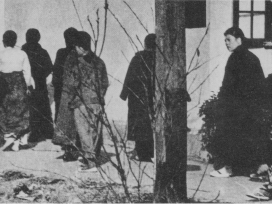Few Tongues, Many Voices?
The Media and European Identity
Even greater media concentration, writes Juan Luis Cebrián, could save Europe from homogenised cultural globalisation.
Even greater media concentration, writes Juan Luis Cebrián, could save Europe from homogenised cultural globalisation.
A brief news story obliges the author to give up an old dream. The chronicle of erratic trips in the era of the Cold War is mixed in this article with the realities of our hot war. Who now remembers how one travelled from a communist country to the West? What does this past have to do with the immigrants of today and the terrorists of yesterday?
The big gap between principles and practise means that the Western democracies run the risk of failure when they try to take on the task of acting as protectors in the Balkans. Fatos Lubonja argues for a “wise and responsible presence”.
Drawing on their book Empire, Michael Hardt and Antonio Negri show how the resistance of the working class has prefigured the globalisation of capital. Now, they contend, we face a new, universal order that accepts no boundaries or limits – Empire. The local focus of a nostalgic Left is in this situation both false and damaging.
In the absence of a democratic regime in Europe as well as an European welfare state – to say nothing about a “European culture” – it is hard to find any foundation of a European identity, argues Claus Offe.
The “clash of civilisations” as largely a function of uneven modernisation suggests that it will not last much longer, which advocates a return to the older tradition of functional-evolutionary theorists. In Europe, Daniel Chirot warns that the differentiation between “East” and “Central” Europe draws a new border between “East” and “West” which will result in excluding the poorer parts of Europe and will keep them poorer in delaying their modernisation.
For us, Europeans behind the Iron Curtain, the idea of Europe was simply a rejection of the Communist project, writes Adam Michnik: freedom instead of servitude, open borders and legality instead of the Berlin Wall and preventive censorship. This vision obviously contained an idealisation of both the practice of the European Union and of its theoretical foundations.
Tolerance and its contradictions constitute a universal problem, which today confronts both conscience and legislation with an urgency hitherto unparalleled in history, writes Claudio Magris. A united Europe will find its universal principles – the core of a tolerance that is more than nobly rhetorical – put to a severe test. Only if the objective difficulties are not underrated can one hope to overcome them.
The global terrorist threat is part of the risk society and blurs the distinction between internal and external security. Ulrich Beck concludes that in order to be able to deal with their national problems today’s states have to de-nationalise and transnationalise themselves.

The societal condemnation of sexual crimes as a war-time practice is slowly growing as the victims raise the courage to speak out.
The democracies of today can remain democracies only if they are able to negotiate pluralism and communality, conflict and justice, rationality and identity. What must we do to meet this challenge, asks Göran Rosenberg and presents a possible answer: federation. But where are the political thinkers and leaders who could formulate and win popular support for a power-sharing treaty in Europe?
In his analysis of the Ukrainian media landscape and its preconditions, Mykola Ryabchuk maintains that “a situation, when people have plenty of rights on paper but cannot employ them in reality has largely persisted in the post-Soviet space. The only substantial difference between the post-Soviet states and the Soviet Union is that the latter had had a compulsory ideology”. Rather than painting a negative or positive future in conclusion, he reminds that there is a future yet to be shaped.
Skenderbeg as a national hero of Albania is just one sign of “history-making” in Albania and Serbia. Fatos Lubonja writes on how the creation of national myths and memories over the centuries has provided the seedbed for the conflicts in the Balkans, but that such memories can also show the way to an open society and provide hope for the future.